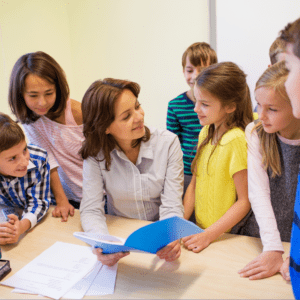Summary:
- What does this standard mean?
- What does meeting this standard look like?
- What evidence can I collect to show that I’m meeting this standard?
The seventh of the Australian Professional Standards for Teachers is to engage professionally with colleagues, parents/carers and the community. This standard is all about how you engage with other colleagues, organisations, schools and systems to provide the best education for your students.
See more: Australian Professional Standards for Teachers Terminology Explained

What does this standard mean?
This standard has four different descriptors:
- Meet professional ethics and responsibilities.
- Comply with legislative, administrative and organisational requirements.
- Engage with parents/carers.
- Engage with professional teaching networks and broader communities.
These descriptors outline how Australian teachers need to comply with societal expectations, laws and policies, as well as form meaningful relationships with parents and carers as well as other teachers. They standards contain some of the most important requirements placed on teachers, which are their ethical and legal obligations to their students and their families.
What does meeting this standard look like?
At the Graduate career stage, teachers are expected to know what the legal and ethical requirements are for teachers. They will be expected to keep up-to-date with relevant law and policy and prove that they can work within them.
Teachers will also need to demonstrate that they can form relationships outside of their classrooms. They will need to engage with parents and carers about their child’s learning, as well as with other teachers who they do not work closely with on a regular basis.
At the higher career stages, teachers will be expected to not just report to parents and carers, but make them more involved in their child’s learning. They will be expected to work closely with them to get the best possible outcome for their students. They may also be expected to participate in meaningful discussions around policy and help develop policy. They are also expected to not just connect with other teachers and institutions, but work closely with them to improve teaching practice for all.
What evidence can I collect to show that I’m meeting this standard?
There are a few different types of evidence that you can collect for this standard:
- Certificates from professional development undertaken through a professional association.
- Emails showing collaboration between you and parents/carers/other teachers.
- Lesson observation notes, behaviour records or reports after school camps or excursions that show how you reacted to dangerous situations according to policy.
- Paperwork (or notes that show that you have completed paperwork) that shows you trying to use school systems and procedures to help your students. For example, you may apply to get a student particular funding or write their Individual Learning Plan.
Learn more about the other Australian Professional Standards for Teachers:
- Know students and how they learn.
- Know the content and how to teach it.
- Plan for and implement effective teaching and learning.
- Create and maintain supportive and safe learning environments.
- Assess, provide feedback and report on student learning.
- Engage in professional learning.
- Engage professionally with colleagues, parents/carers and the community.


